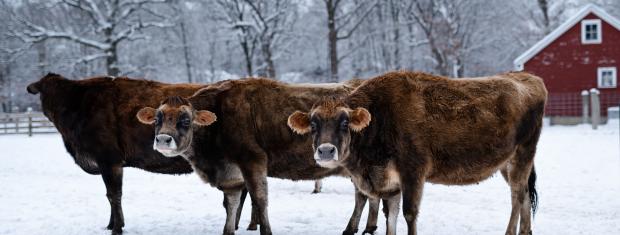
Winter Safety Tips for the Farm
With winter right around the corner, it is the perfect time to discuss winter safety for the farm. Winter brings snow, ice, and freezing temperatures, making it extremely important to put the following safety tips to use in order to keep you and your livestock thriving.
Protecting Your Farm
- Remove Ice Dams: Ice dams can form from heavy snow buildup melting during the day and then refreezing when temperatures drop overnight. Ice dams can be dangerous so its important to get remove them as soon as you can.
- Prepare for Babies: Set up a designated spot for any expecting mothers and babies. The babies will need plenty of warmth, so make sure the area is supplied with a layer of sawdust, straw with sand, or wood shavings. They will also need blankets or jackets to add even more layers of warmth.
- Cover Plants and Crops: Although winter is the downtime for plants and crops you can still take measures to protect them, and maintain them for the spring. Protecting them can help sustain the underground roots and help produce better soil.
- Avoid Water Freezing: Although snow is a form of liquid and water it will not be enough to keep your livestock hydrated. Investing in a de-icer is the best way to ensure livestock get the proper hydration needed to stay healthy. Keep your de-icer away from harsh weather and if needed, consider insulating the tank and pipes to make sure they don’t freeze.
- Prepare Shelter for Livestock: An area for your livestock to be kept is a must in the winter. This area should be fairly similar to the same procedures you take for any babies and expecting mothers. You can winterize the barn or shelter by using lots of dry hay, this will keep the animals warm and dry.
- Ventilate Shelters: Having good ventilation and air flow will protect your animals from illness, prevent higher operational costs, and maintain the condition of your buildings moving forward. Stagnant air flow can also lead to a buildup of germs and pathogens that are harmful to your livestock.
Protecting Yourself and Others
- Dress Warm: One of the most important things to remember is to dress warm enough for the weather conditions. Invest in quality gear and layer it according to warmth, weight, and whether it is water-proof or not. Use a pair of good gloves that allow you to move your fingers freely while keeping your hands warm.
- Bring Safety Gear: Always remember to bring your safety gear. Safety gear can include first aid kit, multitool, headlamp, and your radio or cellphone.
- Watch Weather: Since the weather is everchanging it is important to pay close attention and to the weather conditions and reports. Farming in the winter can be touch and go, so there may be times when you will have to stop tasks to get home in order to stay safe.
- Create Paths: While the traction on your boots can help, covering paths with sand and salt can help speed up tasks on the farm and can add extra protection against falls and slipps Farming is a year-round job, and the winter brings new challenges for not only farmers, but plants, crops, and livestock.
When you are outdoors use these tips to keep yourself and others safe while working in the cold winter weather.


